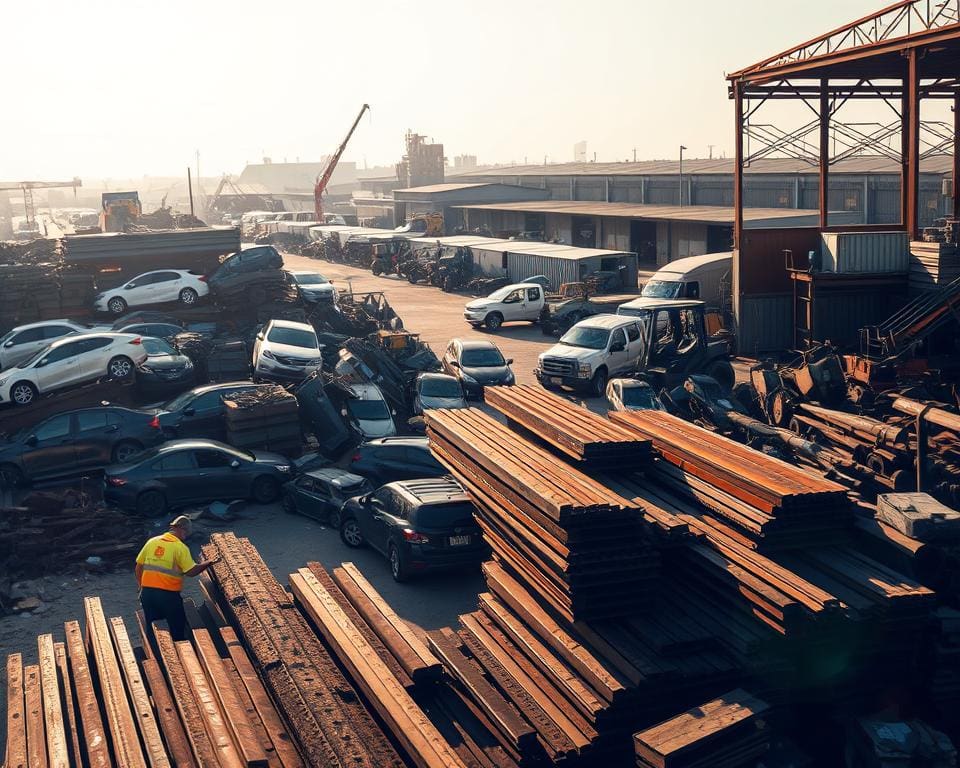Embarking on the journey of establishing a scrap metal business is an exciting prospect, but it raises the vital question: How much does it cost to start a scrap metal business? Understanding the intricacies of the industry can significantly impact your financial planning. The scrap metal sector is thriving, with increasing demands and evolving market trends that present lucrative opportunities for aspiring entrepreneurs. As you consider the scrap metal business startup costs, it’s essential to evaluate various influencing factors, such as equipment, regulations, and operational expenses. In this article, we will explore the financial landscape of starting a scrap metal venture, offering insights into profit margins compared to other recycling businesses.
Understanding the Scrap Metal Industry
The Scrap Metal Recycling Industry plays a crucial role in promoting sustainability and reducing environmental impacts. This sector involves the collection, processing, and reselling of various types of metals that can be reused to manufacture new products. An understanding of the nuances within this industry highlights its significant economic contributions and evolving market dynamics.
Commonly recycled metals include aluminium, copper, steel, and brass. These materials have gained traction due to their versatility and the growing demand from various manufacturing sectors. Factors such as the global shift towards renewable energy and the construction boom have led to increased interest in these materials. Statistics from the British Metal Recycling Association indicate a rising trend in eco-conscious consumers seeking products made from recycled materials.
Geographical variations in scrap metal sourcing further underscore the complexity of the Scrap Metal Recycling Industry. Areas with robust manufacturing bases typically see higher scrap generation, while regions focused on extraction may experience fluctuations in availability. Understanding market trends in scrap metal can provide insights into fluctuations in pricing and demand, enabling businesses to adapt and thrive.

The Importance of a Business Plan
Creating a solid Business Plan for Scrap Metal Business is essential for anyone looking to succeed in this competitive industry. A well-structured plan serves not only as a roadmap for operations but also as a persuasive tool in securing funding and attracting investors. Key components of this plan encompass market analysis, which identifies potential customers and competitors, as well as marketing strategies that outline how to reach and engage your audience.
Strategic Planning for Scrap Metal often includes operational plans detailing the workflow, collection methods, and processing strategies. Financial projections help potential investors understand the profitability of the business and provide a benchmark for measuring success over time. Each element plays a critical role in demonstrating the viability of the business model.
Successful scrap metal businesses understand that a comprehensive business plan speaks volumes, showcasing not only vision and ambition but also a commitment to sustainable growth. For instance, companies that have established solid groundwork are often more appealing to stakeholders looking to invest in promising ventures. They highlight the importance of research and analysis in ensuring the business can adapt and thrive amidst market changes.
How Much Does It Cost To Start A Scrap Metal Business
Understanding the costs associated with launching a scrap metal business is crucial for anyone considering this venture. The financial landscape involves a variety of expenses, both initial and ongoing, which must be evaluated thoroughly. Recognising these expenses will empower you to make informed decisions and plan your budget effectively.
Key Initial Expenses
The initial investment for scrap metal business encompasses several critical components. Shrewd entrepreneurs must budget for essential items, such as:
- Tools and equipment necessary for processing scrap metal.
- A facility or warehouse for storing scrap and conducting operations.
- Initial inventory of scrap metal to kick-start your operations.
Approximations indicate that the initial investment for scrap metal business can range significantly based on location and scale, thus proper market research is essential.
Ongoing Operational Costs
Beyond the initial steps, ongoing operational costs are equally important. Effective management of these expenses will contribute to the sustainability of your scrap metal business. Consider the following:
- Staffing expenses, which include salaries and training.
- Utility bills for running your facility.
- Transportation costs for moving scrap metal and delivering finished products.
- Maintenance costs for keeping your equipment and premises in optimal condition.
Accounting for starting a scrap metal business expenses will give you a clearer picture of the financial commitment involved. A comprehensive understanding of these costs will ultimately drive the success of your new business.
Equipment and Tools Required
Starting a scrap metal business necessitates a variety of essential equipment and tools. Understanding the Equipment for Scrap Metal Business plays a pivotal role in ensuring efficiency and safety in operations. Key items include sorting machines, shredders, and balers, which assist in processing metals into manageable sizes.
Safety should always come first when handling scrap metal. Investing in quality safety equipment, such as gloves, helmets, and eye protection, is non-negotiable for workers. This gear helps reduce the risk of injuries during the recycling process, proving its value far beyond its initial cost.
Transportation vehicles are equally important. Whether it’s a flatbed truck or a van, having reliable vehicles to collect and deliver scrap can significantly enhance operational workflow. Research into financing options, whether through purchase or lease, can lead to more cost-effective decisions.
When acquiring the necessary Tools Needed for Scrap Metal Recycling, sourcing high-quality machinery at competitive prices becomes paramount. Engaging with suppliers, attending trade shows, or browsing online marketplaces can yield substantial savings and valuable insights into the latest innovations in the industry.
In summary, well-thought-out choices regarding equipment and tools can streamline your business processes and elevate your productivity.
Licensing and Legal Requirements
Starting a scrap metal business in the United Kingdom necessitates an understanding of the full spectrum of legal responsibilities and licensing obligations. Compliance with the various regulations is essential for the smooth operation of your enterprise. The Licensing for Scrap Metal Business encompasses several key areas that must be thoroughly navigated to ensure that your business remains on the right side of the law.
Understanding Permits and Regulations
The initial step in meeting the Legal Requirements for Scrap Metal Recycling involves obtaining the necessary permits. One critical permit is the waste carrier registration, which is mandatory for any business handling waste materials. This process not only helps in legitimising your operations but also reinforces a commitment to ethical and sustainable practices.
It is vital to stay informed about the specific regulations from the Environment Agency. These regulations outline health and safety compliance standards that dictate how scrap metal should be processed and stored. Businesses must undertake risk assessments and implement safety measures to protect employees and the environment. The implications of failing to comply with these regulations can be severe, including hefty fines or even closure of the business.
Applying for the required permits can involve several steps:
- Gathering necessary documentation, such as proof of identity and business registration.
- Submitting an application along with the applicable fees.
- Undergoing a review process conducted by the local authority or relevant agency.
Understanding these components contributes to building a robust foundation for your scrap metal business. Being proactive about licensing and legalities can enhance your reputation and ensure long-term viability in the competitive recycling sector.
Setting Up Your Scrap Metal Business Budget
Budgeting is a crucial element for the successful launch of a scrap metal business. Constructing a robust Scrap Metal Business Budget allows entrepreneurs to envision the necessary expenditures and manage resources effectively. Establishing a clear understanding of start-up costs is paramount. This can include various aspects, from equipment acquisitions to initial operational expenses.
Estimating Start-Up Costs
To accurately forecast expenses when setting up a scrap metal company, it is beneficial to categorise costs into fixed and variable segments. Key fixed costs include:
- Purchasing specialised equipment such as crushers, shears, and balers.
- Leasing or buying commercial property suitable for metal storage and processing.
- Obtaining necessary permits and licences that can impact the Setting Up a Scrap Metal Company Price.
Variable costs might encompass:
- Labour costs, which can fluctuate based on staff requirements.
- Utility bills, dependent on the volume of operations.
- Transportation expenses for moving metal to and from your facility.
Understanding these costs sets a solid foundation for your business budget.
Planning for Unexpected Expenses
Every entrepreneur should anticipate unforeseen expenses that may arise during operations. Common pitfalls in the scrap metal industry include fluctuating material prices and unexpected equipment repairs. Establishing a financial buffer to cope with these challenges enhances the resilience of your budget. The experience of seasoned business owners highlights the importance of maintaining an emergency fund, covering approximately 10-20% of your total budget.
Incorporating these strategies into your Scrap Metal Business Budget will help you navigate the complexities of the industry with confidence.
Funding Your Scrap Metal Business
Starting a scrap metal business requires careful planning, especially when it comes to securing funds. Several options exist for Funding for Scrap Metal Business, each with its own advantages and drawbacks. Whether you prefer the stability of traditional financing or the creativity of alternative funding sources, understanding these options will empower you to make informed decisions.
Traditional Financing Options
Traditional financing methods can be a reliable way to secure the capital needed for your venture. Common avenues include:
- Bank loans, which often offer competitive interest rates but may require a robust credit history.
- Government grants that can provide financial assistance without the need for repayment, although they usually involve a rigorous application process.
- Angel investors willing to fund your business in exchange for equity or convertible debt, bringing not only capital but also valuable mentorship.
Each of these options offers unique benefits. Assessing your business model and personal financial situation can help you determine which route aligns best with your objectives.
Alternative Funding Sources
In recent years, many entrepreneurs have turned to alternative funding sources to support their scrap metal ventures. These can include:
- Crowdfunding platforms, allowing you to raise small amounts from a large number of people interested in supporting your business.
- Microloans that cater to startups, providing manageable loan amounts for those who might struggle to access larger sums through traditional channels.
- Peer-to-peer lending which connects borrowers directly with individual lenders, often resulting in lower interest rates than banks.
Exploring both traditional and alternative financing options can provide a well-rounded approach to securing the necessary funding for your scrap metal business. Combining these strategies could open new avenues for success as you embark on your entrepreneurial journey.
Marketing and Branding Your Scrap Metal Business
Establishing a strong brand identity is crucial for any scrap metal business aiming to thrive in a competitive market. Effective brand development in scrap metal recycling not only differentiates your business from competitors but also builds trust with customers. Engaging visuals and a compelling narrative can create a distinct brand persona that resonates with environmentally conscious consumers, many of whom prefer choosing businesses that align with their values.
In today’s digital age, leveraging online marketing tactics can significantly enhance your visibility. Implementing search engine optimisation strategies, creating informative content related to recycling, and actively engaging on social media can help attract potential clients and partners. Additionally, exploring marketing strategies for scrap metal business, such as targeted advertising and email campaigns, can foster lasting relationships with your audience and keep them informed about your services and initiatives.
Community engagement initiatives are equally vital in building a reputable brand. Hosting or sponsoring local recycling events can elevate your business’s profile and encourage community participation. Statistics reveal that consumers are more inclined to support businesses that contribute to local causes. Showcasing successful marketing campaigns within the industry, like those employing innovative approaches to increase recycling awareness, can serve as inspiration for establishing a formidable presence in the scrap metal sector.









